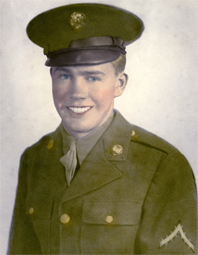

2005 information
Ed entered the Army at Camp Dodge near Des Moines. After several days of shots and being issued clothes that didn't fit, they put Ed
on a train headed for Fort Jackson, South Carolina. He was one of the original 414 in the 2nd Platoon under Lt. Edwards and Sgt. Whitley.
Ed recalls the following information: "All that I remember about Tullahoma was that we were in six-man tents, and it was cold.
New Orleans--Some of the guys went to the Sugar Bowl on New Year's Day 1944. I spent thirty-one days on board the ship including a trip through the
Panama Canal. We zigzagged all the way across the Pacific Ocean. When we arrived at Bora Bora, we all got off the ship. It felt good to get your feet on
solid ground again. In New Guinea, we crossed the equator on February 4, 1944. We rejoined the 414th six months later on Luzon and were busy
doing all kinds of work--sometimes up to the front lines. In Japan, we moved into a racetrack in Kyoto. It was the only large city in Japan that wasn't bombed.
We left Japan on the S.S. Lurline. It was a fine ship. I think it took us seven days to get to the states. I traveled from Seattle to Denver on the train, and was
discharged at Fort Logan, Colorado, on January 9, 1946.”
Corporal Sextro received the following honors: Asiatic Pacific Service Medal, Philippine Liberation Ribbon with one Bronze Star, World War II Victory Medal, and Good Conduct Medal. He saw action in New Guinea, Southern Philippines, and Luzon.
Ed Sextro and the "Snorting Bull" of the 414th Engineers
Ed Sextro farmed in the Manning, Iowa, area most of his life. Born in Butte, Nebraska, on April 17, 1923, his family moved to Manning when Ed was four. He spent his entire life in the area except for the three years he served in the military during World War II.
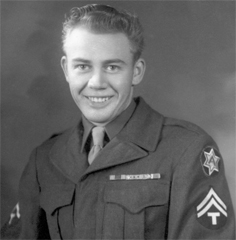
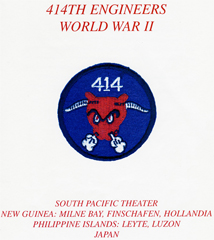
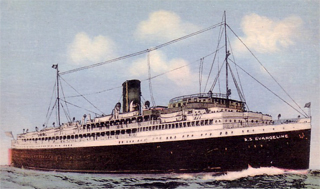
They cruised down the Mississippi for 90 miles to the Gulf of Mexico. According to Ed, "at
chow time, they hit the Gulf. If looking at the food didn't make you sick, the
rough water did." He describes seasickness, "remember
the worst hangover you ever had and multiply it by ten." He was sick for
all five days they were in the Gulf. By the time they reached the Panama Canal
on January 30, things got better. They got their last fresh water shower here
until Bora Bora. By showers, they meant that wide tubes were thrown over the
sides of the ship and the men were hosed down.
After leaving the canal, the Pacific was smooth most of the time. The ship zig-zagged all across the ocean.
They were given no coverage and no escorts. At sea they changed course every
three minutes as it took a Japanese submarine four minutes to sight a ship and
fire the torpedoes. There was no smoking allowed at night as a lit cigarette could be seen for miles.
According to Ed the food aboard the Evangeline was bad. On Sundays they got chicken.
It was put in a large pot and boiled. When the meat came off the bone it was
done and ready to eat. Ed said, "so much for the food." The men would
buy sandwiches and fruit from the Merchant Marines. The CREW ate well and their
cooks would make sandwiches from the leftovers and sell them to the men for $2.00.
On February 12, 1944, they stopped for two days on the island of Bora Bora to
refuel. Finally, a fresh water shower. The salt water
ones had left their skin dry, flaky and painful. Then they were off to New
Guinea. One of the men kept meticulous notes observing that they crossed the
International Date Line on Friday, February 18, 1944, at 6:37 pm.
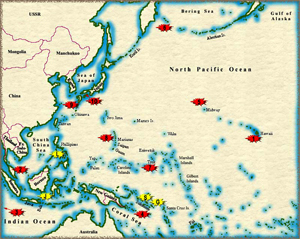
They
continued around the coast of Australia and over to Milne Bay, New Guinea,
arriving there on February 25, 1944. The men were told to debark which
consisted of going over the side and climbing down a rope net carrying their
duffle bag, full fuel pack, gas masks and weapons. It took all their strength.
The trip had been a nightmare and the 31 days on the Evangeline had taken its
toll. The men had slept in canvas bunks stacked four high. The quarters had
been hot, humid and crowded. Their clothes were in threads. Many of the men had
been sick the whole voyage. The entire ship and the men smelled. One of Ed's
buddies after finally setting foot on land and watching as some of their emaciated
shipmates were taken off on stretchers said, "I don't know about the rest
of the guys, but I was about ready to surrender to the nearest Jap." At the very end of Ed's journal, was this poem. The author was not identified. A HITCH IN HELL At times the men spoke of the horrors of war and the atrocities they witnessed but for the
most part they spoke of the bond and camaraderie they shared.
Ed recalled that they stayed at Milne Bay for one month and it rained the whole
time. They were always knee deep in mud. They were moved around a lot and ended
up in the town of Finschafen. Here they set up tents
and began to work on roads. They discovered weird animals on the island. There
were wallabies, lizards that liked the soldiers' warm boots, as well as fruit
bats with wing spans of four feet and fish with skeletons on the outside. The
men slept in hammocks with their bayonets at their side. One night there was a
loud ruckus in camp. Torrey woke the whole unit and destroyed his cot when he
tried to bayonet the rat that had crawled in with him.
Captain Rayca wanted discipline and expected them to
behave like soldiers. They often tested his patience. Virgil P., a friend of Ed's
and a fellow Iowan from Perry, described some of the ways the men entertained
themselves and irritated the captain. "We got good at making Jungle Juice.
One time we had a batch going in our tent. We had built a kind of desk around
the center tent pole and had a 5 gallon water can (the still) buried in the
ground beneath it." You had to look close to see it. One of the officers
walked by and smelled it brewing and notified Captain Rayca.
This was completely against regulations and the captain rounded up a group of
guys to search the tent. Before he could return with his posse the men jerked
the can out of the ground and pulled the hose out of the top of the can. They
planned on tossing it into the jungle but the captain was back. Virgil recalls,
"As they came in with Rayca ranting and raving,
we knew we were sunk." But Mason, one of the men grabbed to search the
tent was a friend of Virgil's and also one of the first to enter the tent. He
immediately saw the can with the hole in it and sat on it as the rest of Rayca's MPs tore up the whole place looking for the still.
Mason just kept sitting there until they finally left. The men told the captain
the smell must have come from the next tent down. Virgil said, "We may not
have been good soldiers but we were good liars."
While it may seem that the men loved to antagonize their captain, they were
loyal to him and he to them. The captain expected the
men to follow orders and Army regulations but he did not want anyone else
disciplining his men - not even a superior officer. Colonel Barkley and the
captain were always at odds. The colonel was described as a tough one in charge
of special forces and a stickler for training - "very
G.I." as Virgil put it. Captain Rayca always
caught hell as the colonel felt he was not hard enough on his men and demanded
they be disciplined for what Rayca felt were minor
infractions - once it was for stealing apples. When the captain refused to
reprimand his troops the colonel relieved him of his command and threw him in
the stockade - on three separate occasions. Each time after a few days the
captain was released and sent back to the 414th. No one else wanted to command them.
From Finschafen they were ordered to Hollandia. At the last minute the 6th Army wanted to load
some priority material so Ed and fourteen others along with their equipment
were left behind. They were told it would be a matter of a few weeks and they
would catch up with the rest of the unit. The Army left them behind and
promptly forgot about them.
As the weeks went by their tents rotted away. They built shelters from
discarded lumber from the dumps. In the months that followed they had no money,
their clothes were threadbare and they needed other supplies. They used hand
grenades to get fish to eat. Ed went through a dump and found some black
currant jam that no one would eat and the Army threw away by the case. He found
some sugar and yeast and made wine. According to Ed, "it turned out really
good." Ed then found a still and an old gas stove. With the help of
another G.I. they made alcohol from cracked wheat, sugar and yeast. "We
didn't drink much of it," Ed said, "but I could sell it as fast as I
could make it." Thus they financed their stay there.
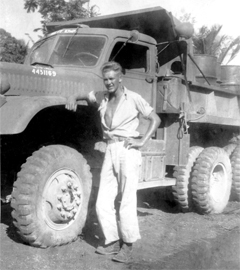
Ed next to his Army truck
One of Ed's fellow truck drivers probably thought the general should have been
gone more often. Otto W. said he was driving past 6th Army Headquarters one day
with the usual 4 tons on a 2 1/2 ton truck when a jeep pulled out in front of him.
It was General MacArthur himself at the wheel surrounded by MPs "I managed
to stop with a yard to spare." Otto said.
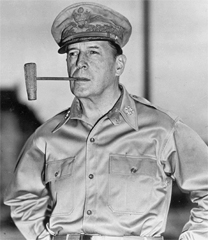
General Douglas MacArthur, Commander of the American Armed Forces in the Pacific
Most units would have been worried about this structural malfunction, but Virgil
again, Ed's buddy from Perry, who never seemed to be at a loss for words,
summed up the feeling of all the men of the 414th when he said, "We all
knew they wouldn't fire us, and there wasn't any place much worse than where we
were, so we set right to work making the world a better place."
In December of 1944 the men were sent to Leyte in the Philippines. One evening
on the way there the convoy they were in was attacked by six Kamikaze planes. Ed's
unit was not hit but one ship in the row beside them and one in the row behind them were hit and set on fire.
Landing in the Philippines they found that the Japanese were dug into the hills
and were firing at the beach where the 414th was landing at night. They were
camped near a field hospital in a sea of mud where they set up an anti-aircraft
gun. The men could see and hear the shells as they came in toward them. The
navy ships were returning the fire. One night a Japanese bomber plane came in
so low that the men in Ed's unit could see the two pilots in the plane talking to each other.
By this time Ed and the other fourteen men left at Finschafen
had caught up with their unit. They discovered stacks of mail waiting for them.
One of them (Otto) had received cans from home marked "juice"
and opened one with his bayonet. It was whiskey. There were quite a few
juice cans. This was of course strictly forbidden. The men loved it but keeping
it a secret was a problem. Word got back to Captain Rayca
and he sent for Otto. Otto recalls standing at attention as the captain said, "I
understand you got some canned booze." Otto knew he was in trouble as he
replied, "yes sir." Otto continues, "The captain looked up at me
for a long while and then said, "can you get some more?"
Christmas in the Philippines wasn't different from any other day although Elmer
said it looked more like the 4th of July because there was an air raid. The
raids continued on a daily basis and sometimes twice at night.
By this time the unit was in a town named Dagupan.
They were kept busy. Ed and the other drivers hauled engineering supplies and
equipment to Subic Bay over ziz-zag pass. It was a
dangerous drive often to the front lines at night with only the blackout lights on.
When they'd been overseas eighteen months the unit celebrated together. They
all had saved three weeks ration of beer and Captain Rayca
got some rum in Manilla. Ed didn't remember the name of the place that they had
the party and his only comment on that night was, "beer and rum don't mix very well."
The war got to a few of the men. One of the guys went off the deep end and
decided that the war was the captain's fault. It was also the captain's fault
that they were all there. He grabbed his rifle and set off the kill Rayca. A bunch of the men took his rifle and tied him up for the night.
Getting supplies was always a problem, but the 414th had an ace in the hole.
One of the men in the unit had the unusual name of Kernel Petrice.
When things got desperate they would put him on the phone and he would say, "Kernel
Petrie calling." They always took his call.
Following the two atomic blasts in August of 1945 and the unconditional
surrender of the Japanese, Ed's unit was sent to Japan as part of the
occupational forces. The war was over and his unit was camped at a racetrack in
Kyoto - the only large city in Japan that was not bombed. They had a pretty
good time. Ed and another guy raced horses around the track and three men in
the unit went to the Emperor Hirohito's box at the track and cut a piece of
dark red, plush carpet and put it in their sleeping room.
Of their time in Japan, Ed said, "I'm not a beer drinker but I sure did
like that Japanese beer and there were plenty of girls to drink with."
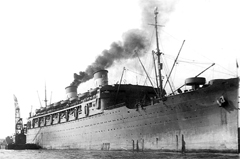
S.S. Lurline
I'm sitting here thinking of what I left behind
And I'd hate to put on paper what's running through my mind
We've dug so many ditches and cleared so many miles of ground
A neater place this side of hell just cannot be found
There is a certain consolation tho' so listen while I tell
When we die we'll go to Heaven cause we've done our hitch in hell
We've taken a million Atabrine, those yellow little pills
To elevate our systems against the fever and the chills
We've seen a million ack-ack bursts above us in the sky
As we run for dingy shelters as the daisy cutters fly
Put out those lights and cigarettes, we hear the sergeant yell
This ain't no picnic here - it's another hitch in hell
When the final taps are sounded and we share our earthly cares
We'll pull our best parade upon the golden stairs
The angels will be there to meet us and harps will gladly play
We'll draw a million in canteen checks and spend them in a day
Gabriel will blow his horn and St. Peter will proudly yell
"Front seats you guys from Guinea, you've done your hitch in hell."
The men of the 414th met every year somewhere in the Midwest. For decades Ed
attended the reunions. Only in recent years have there been too few of them left.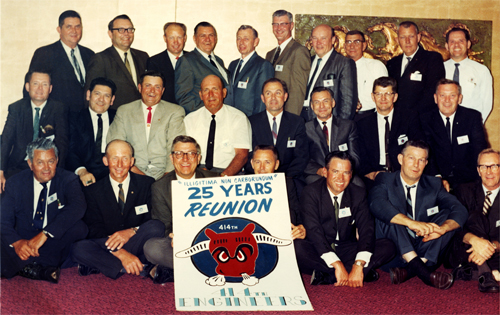
25th
Anniversary reunion: Ed Sextro back row, third from left
Ed and his comrades in the 414th Engineers left this incredible journal behind.
Talk about telling a story from the grave!
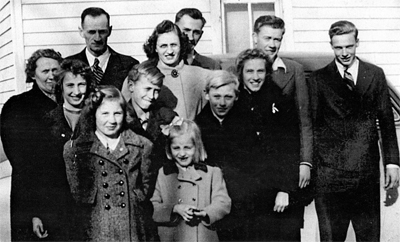
Sextro family - Back: John, Leo, Ed, Herb
Third: Clara (Lechtenberg), Helen, Marie
Second: Dorothy, Leonard, Norbert
Front: Ruth, Maxine
Missing from picture: Edna who died at 16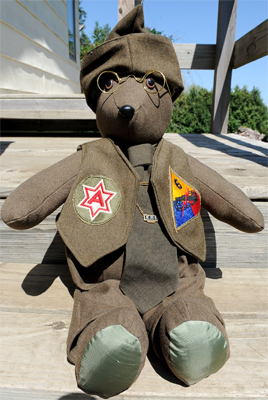
The family took Ed's uniform and patches and made it into this military honor bear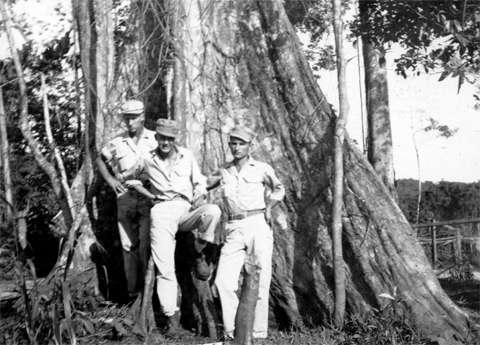
Ed Sextro in the center